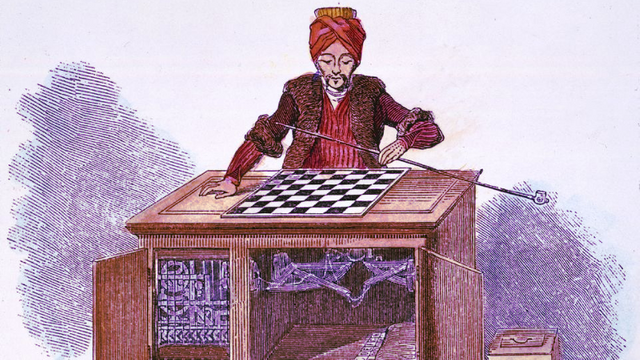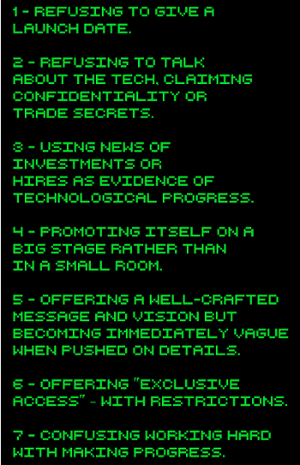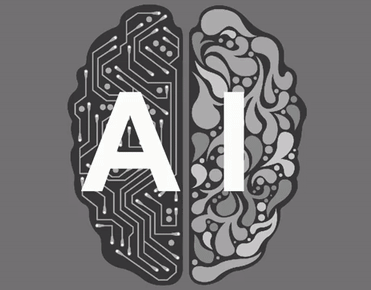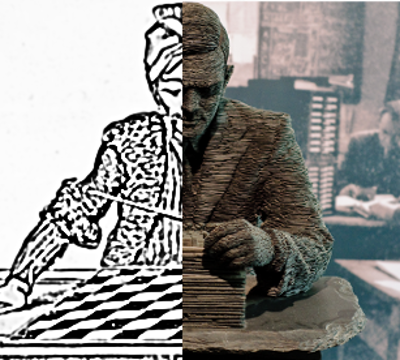Does The "Artificial Intelligence" Industry Think You Are Stupid?

ALMOST 250 YEARS AGO, in 1770, a wonderful machine (pictured above) was presented before the Empress of Austria. The Turk (as the device was called) was a chess-playing automaton, which could beat most human opponents.

We haven't come that far forward since then.
The coming revolution in Artificial Intelligence has been creating a stir for a few years now, and the media regularly report on the latest breakthroughs. Recently, we were presented with a “debating computer” which was watched by a large audience as it engaged in discussion with a professional debater. According to the audience's votes, the machine won the debate by a significant margin.
So where and when does this AI revolution start to affect our lives?
The answer to that is: don't hold your breath – hold your nose instead, because the truth stinks.
The endlessly-hyped AI revolution isn't even on the drawing board yet. What you are seeing in the media is a procession of eye-catching gizmos and software that can perform specific tasks convincingly under certain tightly-controlled conditions. What you are not seeing is evidence of the imminent computerised takeover of the human race. In short, it's a con.
The Anatomy Of The Scam
A FEW YEARS AGO, the IT-savvy website The Register debunked a company that was making some very extravagant claims about the supposed marvels that it would soon be offering to the paying public.
The Register thoughtfully provided readers with a rule-of-thumb guide to spotting such charlatans, which I have taken the liberty of reproducing for you (pictured right).
Now think back to the most recent event at which some new AI innovation was unveiled, and tick off all the points that appear on that list.
The unpalatable truth is that every AI demo scores more or less a “full house.” It's a handy little reference that should be consulted the next time some alleged “AI” contraption wows journalists and editors.
Journalism, in case you hadn't noticed, is a profession that is so technologically-naive that it has been decimated several times over by the digital era because it has no idea how to adjust to the internet.

Once-great newspapers are reduced to panhandling for donations and pleading with readers to turn off their ad-blocking apps.
But the news media did learn precisely one basic lesson about the digital era, and they've sworn by it ever since.
The lesson was the Millennium Bug, which older readers will recall as the terrifying global IT disaster that never actually happened in the end (pictured left: a typical warning from the 1990s).
The (very immoral) moral that the press drew from this embarrassing episode was: Never Put A Deadline On Your Doomsday Predictions. That way, you can titillate and alarm readers for as long as you like.
How IBM Rigged Its DemoLET'S RETURN TO IBM's “debating machine.” It was designed to perform -- and I use the word "perform" rather than "function" -- under very specific conditions. It picks up keywords from the speech of one human – and only one human at a time. A fairly simple program then cobbles together a rough argument against that speaker, drawing on nothing more than text that it has hastily scraped from the internet. The machine then recites bits of its turbocharged googling, via a bog-standard synthesized voice program.
The machine is only programmed to produce contradictory arguments. It couldn't engage in constructive dialogue, or even anything approaching a normal conversation. In fact, if its human opponent deviated from the pre-arranged topic, by (for example) asking about oil prices or immigration, then the machine's act would break down almost immediately. Put bluntly, it doesn't “understand” a damn thing that's going on around it.
But (as you will naturally protest) the audience felt that the machine won the debate! So how can that be evidence of a hoax?

Let's look at something the machine said that impressed that audience. Its synthesized voice solemnly declared that investing in space-exploration was like buying a new set of tyres for your car, because it would reap benefits in the long run. It's the sort of superficial platitude that you might find in a cheap fortune-cookie.
The machine didn't actually advance any argument at all. Rather like a conjuring trick, the whole charade depends on the audience's willingness to believe the illusion. In fact, a conjuring trick is exactly what it is.
The Turing TrapIT ALL COMES BACK to something referred to as “the Turing Test.” In general terms, British computer pioneer Alan Turing proposed the notion that if we couldn't tell the difference between interacting with a machine and interacting with a human, then it would make sense to treat the machine as though it were human.
But by the same logic, if we can't spot how a magician managed to produce an egg from his ear, then it makes sense to believe that the magician's ears contain eggs. And, I think most people would agree, that would be just downright stupid.

Alan Turing himself (monument pictured left) is often held up as an example of someone whose autism powered a genius-level intellect that was decades ahead of his time. Turing died in 1954, before autism was accepted by mainstream psychology, and so whether he really was autistic is unknowable.
But the thing that convinces me that Alan Turing was genuinely autistic is precisely the Turing Test. The autistic mind cannot instinctively distinguish between people and objects. Turing's test is evidence of how he rationalised his own difficulties with comprehending other people.
The logic goes like this: “People are objects, but you can talk to them. Since you can talk to them, you know they are alive. Therefore it makes sense to treat an object that you can talk to as though it were a person like yourself.”
It might be sound logic, but it's absolutely awful reasoning.
Turing's Test set a terrible trap for future generations. It has encouraged people to think of themselves as nothing more than biological machines. At the same time, it has allowed the mass media to peddle deceptions that convince the public that we are on the verge of some huge breakthrough -- which might end up replacing the inferior biological machines altogether.
None of this tech is anywhere near being useful in any real-life situation whatsoever. And nor is it going to be, for years and years -- if at all.
A Dose Of (Non-Virtual) Reality
IF YOU STILL honestly believe the idea that this new technology really exists, then I encourage you to try navigating a corporate helpline that uses speech-recognition.
In my own experience, trying to resolve a problem with PayPal via telephone is an illuminating test, and one which will only take a few hours.
When you have given up in despair, after tearing all your own hair out, you might ask yourself why a world-spanning finance company worth $13bn can't buy better interactive software. Spoiler – it's because there isn't any.
Oh yeah, and the mechanical chess-playing Turk mentioned at the start of this article? The complicated levers and gears of the mechanism were just a distraction. In reality, for 80 years it was operated by a succession of well-paid human chess masters who squeezed into the cabinet underneath.
Over several generations, hundreds of thousands of paying spectators witnessed the Turk in action. None of them ever realised that they had been fleeced by a confidence trick.
⦿ All Rights Reserved
Dear Garrick Alder..!!
Artificial Intelligence can never defeat human Brain..
To the question in your title, my Magic 8-Ball says:
Hi! I'm a bot, and this answer was posted automatically. Check this post out for more information.
Hahaha! QED
G’day mate! and I Upvoted you :) !
:
“When it comes to things such as sugar and rice, most people believe that brown is superior to white. But when it comes to human beings, they believe that the opposite is true.” ====> Mokokoma Mokhonoana
Curated for #informationwar (by @commonlaw)
Our purpose is to encourage posts discussing Information War, Propaganda, Disinformation and other false narratives. We currently have over 7,500 Steem Power and 20+ people following the curation trail to support our mission.
Join our discord and chat with 150+ fellow Informationwar Activists.
Connect with fellow Informationwar writers in our Roll Call! InformationWar - Contributing Writers/Supporters: Roll Call Pt 8
Ways you can help the @informationwar